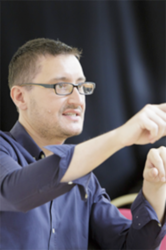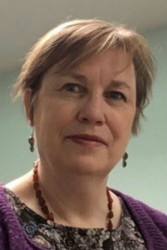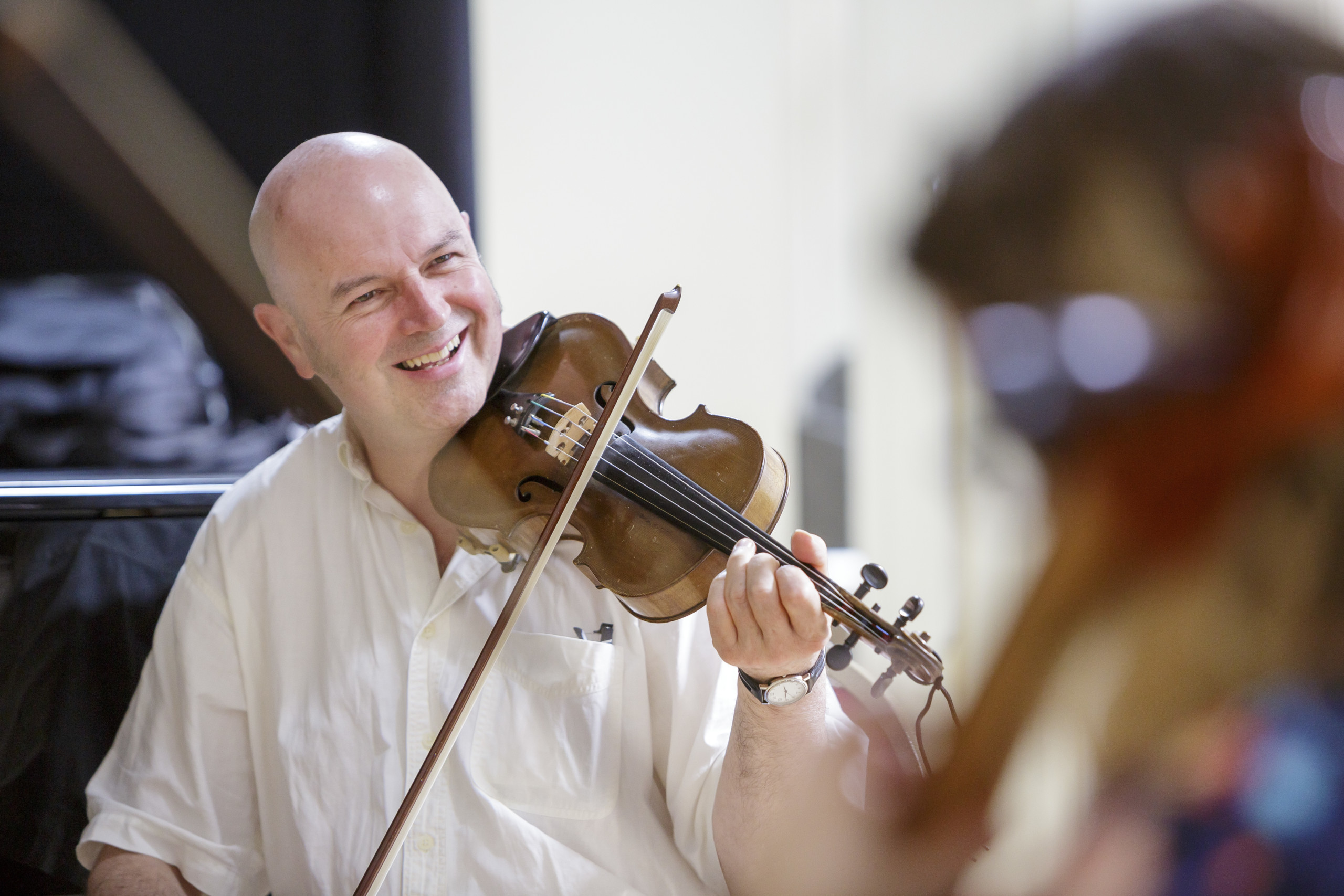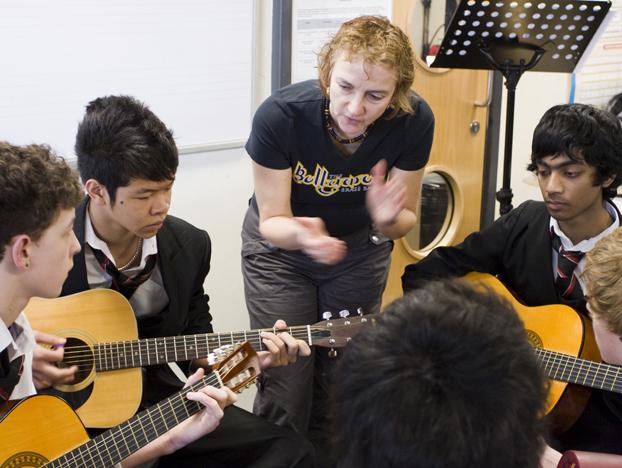
Introduction
Applications for September 2024 are now open and can be made via UCAS Conservatoires. Please sign-up to our Professional Development Music mailing list to be kept informed of programme announcements.
Please note, this programme has recently changed name from ‘MA International: The Teaching Musician’ to ‘MEd Music Education
The MEd Music Education (Online) is an accredited professional development route for practicing music teachers and music leaders. Its online and flexible structure permits suitability for those working in a wide variety of settings, including classroom teachers, instrumental/vocal teachers and community musicians. The MEd Music Education will develop your understanding of current learning models and core pedagogies in music, while supporting you to refine your practical skills through sharing of practice, relating theory to practice, observations and inspiring work placements.
The programme equips students with the tools to reflect upon their practice; develop a critically aware appreciation of contemporary research in music education; engage in informed discussion within a diverse international community of learners; critically analyse contextual practices; and manage their own future development as a professional. The MEd also develops skills in designing and undertaking research.
The programme is designed around a substantial portfolio of asynchronous resources, curated to offer students the flexibility to study at their own pace, and to select material that best suits their professional needs. Students will engage in online conferencing and a variety of other synchronous and self-directed activities, and will be able to use their professional practices as a basis for assessment tasks. The live classes and forum discussions will aid the development of a learning community, and students will be supported in regular 1-1 supervision and tutorials.
It has opened my mind to so many new ideas. I have found that musicians all around the world face similar thoughts, questions and drive for improvement.”
Course Details
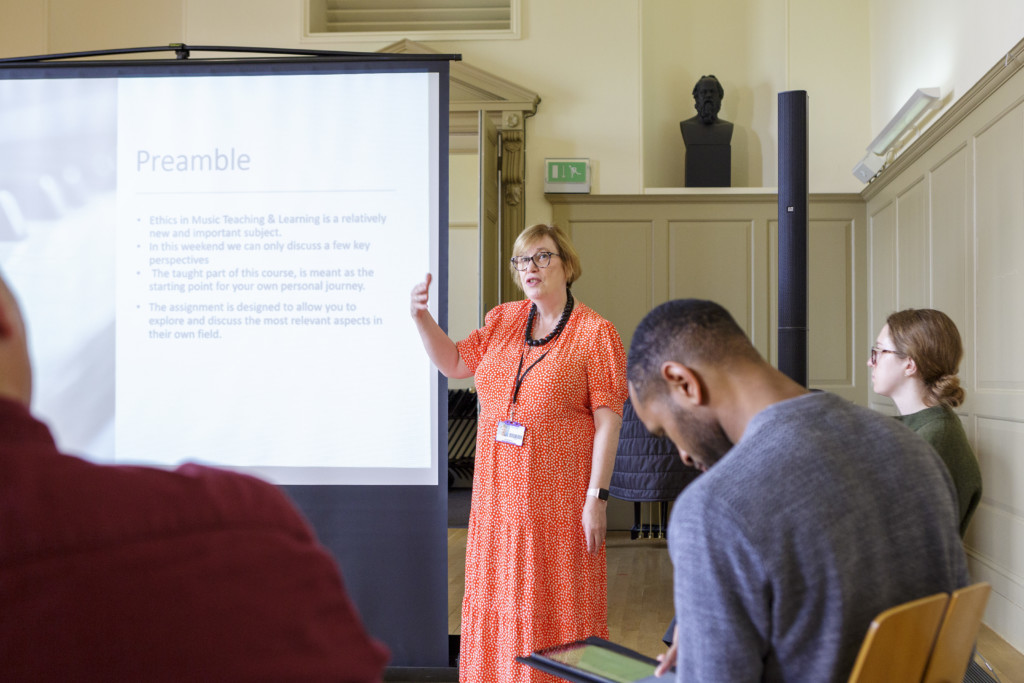
The programme will enhance your musical leadership skills, offer opportunities to engage with current ideas and research in music education and support you to develop your practice. It invites you to consider your own work as an educator within a wider context and evaluate its impact. It also embeds the importance of both theoretical knowledge and practical, lived experience, creating a circle of reflective practice that ensures your teaching and leadership remain relevant, fresh and effective.
The MEd Music Education programme consists of three blocks of study taught by our core staff and a range of visiting speakers:
BLOCK A (PG Certificate) Modules (60 credits): Block A outlines the core theoretical concepts that can be applied to practice, supporting the development of an ethical stance, and facilitating a placement that helps you refine contextual understanding. Students choose from a range of teaching resources that explore the pedagogy and practice of instrumental/vocal teaching, class or group teaching and creative, participatory learning. The structure allows you to engage with concepts most relevant to you and creates an environment in which pedagogic principles can be explored across professional contexts. There is regular online discussion through forums and live study groups, and 1-1 staff support. You will also undertake an Education Placement to gain insight into a musical learning context that is new to you.
BLOCK B Contemporary Practice Modules (60 credits): Block B extends student knowledge through the adoption of innovative technologies, an interrogation of the concerns of contemporary writers in music education, the support of a learning mentor and either an investigation into the social impact of music making or an examination of the underlying principles of music education in the UK. An option is available to undertake ten hours of 1-1 study with a member of Trinity Laban’s performance staff.
BLOCK C Personal Project Modules (60 credits): Block C directs students towards the creation of new knowledge, first equipping them with the skills to interrogate and design research methods. This block will develop your research skills, whether academic or practice-based, while extending your practice. The Personal Project consolidates learning from other elements of the programme and involves self-directed research in an area specific to each student, developing the skills necessary for doctoral study.
- Blocks of study may be taken concurrently, or separately.
- You may take study blocks worth a maximum of 120 credits in any one year.
- Block A modules should always be taken at the beginning of a programme of study.
- For guidance, we usually expect students to undertake 10 hours of learning activity towards each unit of credit. This includes private study, personal practice and reflection, work towards assignments and online activity, as well as attending online study groups, supervision and tutorials. 120 credits is equivalent to one year of full time degree study.
- Enrolment need not be continuous (i.e. you may return to study after a time away) but we usually expect the MEd to be completed within five years.
This range of learning opportunities permits students to gain a rich appreciation of international practices and philosophies of music teaching, learning and participation, supporting the development of a broad and diverse skill-set with knowledge at the forefront of their discipline, music as their primary language of engagement, high-quality reflective practice and a mind-set of life-long professional development. Completion of the MEd serves as preparation for doctoral study.
For further details see the programme specification.
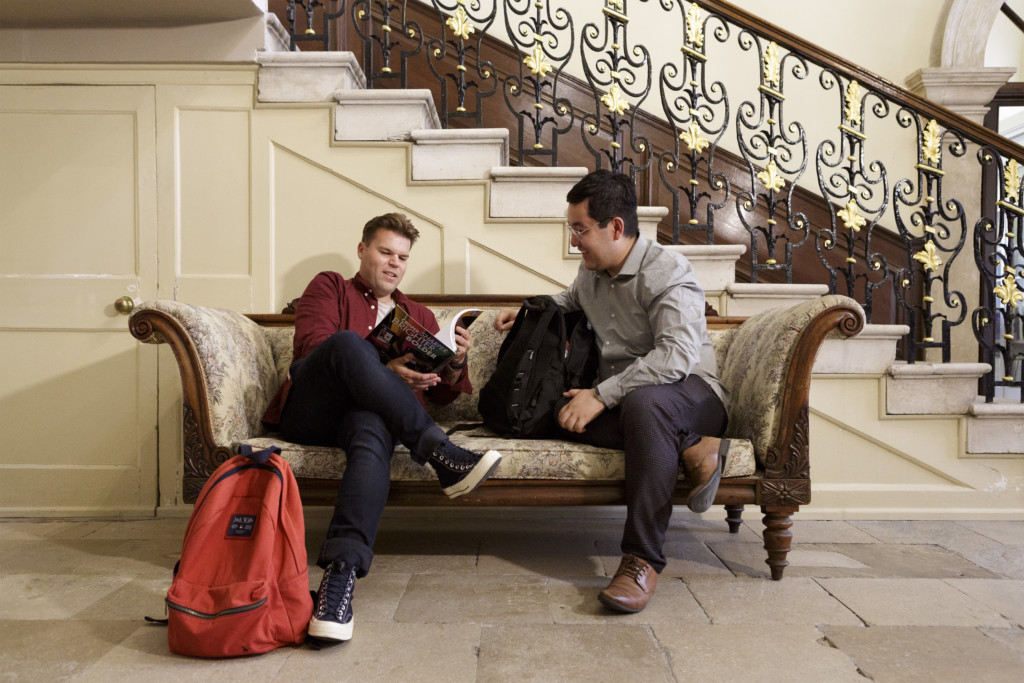
It’s really inspired me to look at what I do and change my practice to make it more innovative and learning focused, and given me the confidence to move on with my career and get back to doing what I love.”
Teaching
Teaching staff for Music Education are all highly experienced practitioners, teachers and researchers from across the globe. A number of the team teach at other leading higher education institutions and join Trinity Laban specifically to teach on this programme. Guest lecturers are also invited who are leading specialists in specific areas. Click below to read biographies of our core teaching team:
- Tim Palmer (Programme Leader)
- Dr Robert Wells
- Janet Munro
- Dr Dave Camlin
- Dr David Baker (Guest Lecturer)
- Dr Jo Gibson (Guest Lecturer)
Recent guest lecturers have included: Mary Stakelum, Graham Welch, Adam Ockelford, Anna Bull, Phil Mullen, Chris Philpott, Gary Spruce, Susan Young, John Finney, Kathryn Deane, Karin Greenhead, Daniel Leech-Wilkinson, Lee Higgins.
How you will learn
Learning takes place online through a blend of formal tuition, experiential learning and personal study. Academic teaching and supervisions, personal self-study and research, and observation of and participation in professional practice are the central elements of the provision. Students will develop and contextualize their learning with placements, observations and reflective practice tasks. Practical experiences are blended with theoretical knowledge to develop students’ pedagogical skills and understanding, and their creative responses to challenges. Visiting lecturers expose the students to a variety of views and approaches current within the profession.
The programme aims to enable students to develop independent learning strategies for lifelong learning. Tutors will regularly encourage reflection on learning and support the personalisation of study to each student’s professional setting.
All modules have a substantial portfolio of asynchronous learning materials, including seminar videos, curated and recommended reading. Modules also have a variety of forms of student-student and student-teacher interactions, including Moodle forums, interactive discussion boards, MS Teams video-conferencing and chat tools, and through formative assessment portfolios. Students will have regular live study groups via MS Teams, 1-1 supervision and personal tutorials; all written submissions are able to receive draft feedback from staff.
Placements and Exchanges
Block A includes an Education Placement module; the Learning Mentor module may involve observation of new work contexts.
It’s been amazing: thought – provoking, challenging and practice changing. I’m constantly reflecting and adapting my practice. I have
new-found confidence and am happy in the knowledge that my practice is supported by theory.”
Alumni Destinations
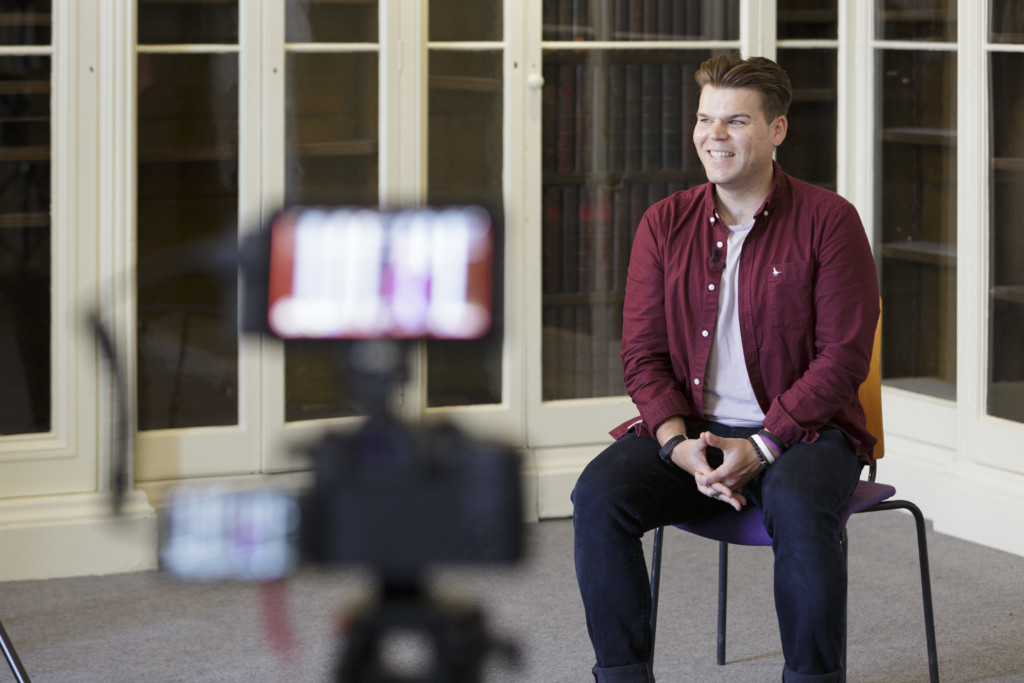
Students report that the programme builds connectivity and a network of support in what can be an otherwise isolating work environment. Other students have been approached by employers to deliver training based on research undertaken for the Personal Project module, have built new and innovative teaching techniques into their practice and seen enhanced job prospects through the value that an MEd from a world leading conservatoire holds.
Our graduates go on to follow careers in leadership within a range of areas related to music education and community music. An increasing number are electing to take doctorates in music education and to publish their personal projects as journal articles.
I highly recommend the course. It has exceeded expectations and has changed my practice and developed my confidence considerably.”
Assessment
Assessment methods as far as possible mirror professional requirements and demand a high level of reflective practice. For example, Theory into Practice requires (as one option) a workshop plan, which is put into practice before submission and its efficacy evaluated. Reflective practice is taught as a specific topic and students are supported in its use through additional online content. Breadth and depth of study is demanded: in the Education Placement, for example, students have to both examine the teacher/context/pupil interactions through a theoretical lens, and drill down into one aspect of policy, ethics, management or pedagogy in their observed context. Whilst most submissions are written, multi-media submissions are encouraged for some assignments.
Assessment is both OF practice (via video observations, for example, or the creation of resources or lesson plans) and ON practice (reflective and evaluative writing, for example), and follows a trajectory through the programme of increasing student choice. Deadlines are spaced carefully throughout the year, and the emphasis on professional practice means that tasks are often incorporated into working schedules.
Feedback from staff is offered formatively in live online study groups, via forum post responses and through the return of draft submission; peer feedback is harnessed in study groups and through the forums. Summative feedback is offered in grading and all credit-bearing submissions also generate substantial levels of formative feedback via comments on the script and summary text. The staff team embed assessment and feedback processes within learning design rather than solely as a summary device; they seek to develop dialogic processes, and work to enhance assessment and feedback literacy via activities such as the sample marking of texts and the provision of sample submissions.
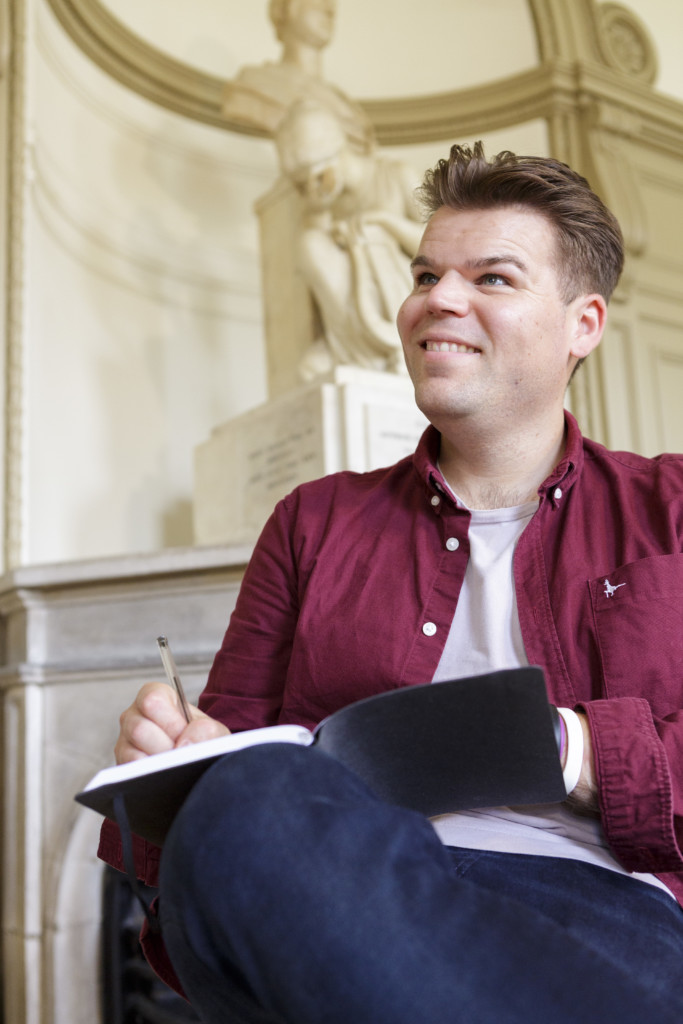
Who Can Apply?
We welcome musicians working in any genre, instrument or context who are established practitioners, working in one or more music education or participatory music contexts within or outside of the UK. You may, for example, be a music leader, an instrumental/vocal teacher, music hub employee, ensemble leader, community musician, freelance workshop leader, musician in residence, music specialist in a school or working in an early years or SEN/D setting.
This is a non-auditioned programme, assessed through UCAS Conservatoires application only, with Recognition of Prior Learning (for those without a first degree) conducted via written task and interview. Please note this programme is not eligible for Student Visas
Entry Requirements:
- A degree, or equivalent training and/or professional experience. The programme welcomes applicants who do not hold an undergraduate degree, but can demonstrate equivalent previous study and/or experience. Applicants without a degree will be required to apply for Recognition of Prior Learning to demonstrate suitability for postgraduate study;
- Considerable professional experience in music education and/or participatory settings, which should normally be current or recent, and a current professional practice;
- Fluent musical skills on a principal instrument/voice (normally grade 8 or equivalent professional experience);
- (for International Students) IELTS 6.5 overall with a minimum of 5.5 in all 4 areas / Trinity College London – Integrated Skills in English III (ISEIII).
A successful applicant to the programme will need to demonstrate the following through a personal statement:
- The capacity for independent, critical and reflective judgement;
- Intellectual curiosity and the potential for innovative pedagogical and musical development;
- A critical understanding of the diversity of learners and the complexities of the education process;
- The ability to organise and articulate opinions and arguments in writing using relevant specialist vocabulary.
In order to access the full range of Education Placements, UK based students will need to have an Enhanced DBS Check.

Fees and Finance
Students can opt to pay for 1 year programmes in full, or in 3 instalments per year to spread the cost of study.
Academic fees for 2024 entrance are:
Fee per Block (60 credits)
£3,650
(instalment cost: £1247 x 3)
Learning Mentor Instrumental Lessons Additional Fee: £850
BLOCK A Certificate Modules (30 credits a year over 2 years)
2024-2025: £2080
2025-2026: £2160
Termly instalment options are available.
Please note that for those hoping to study with us beyond 2024, fees are subject to an inflationary rise each year broadly in line with the Retail Price Index (RPI).
Please note that the Teaching Musician programme does not usually offer scholarships, not is it eligible for council tax exemption. However, we have the following discounts available:
5% off for members of ISME, the ISM and the MU;
10% group discount if an employer puts 4 or more employees through the programme.
Employers’ contribution scheme – please see details on our website.
Please see programme FAQ’s for information about assistance in funding a masters in the UK
Voluntary Residential
We recognise that some students might want to come to London in support of their studies and to meet staff and fellow students. An in-person complementary annual residential programme at Trinity Laban’s historic campus is offered alongside the credit-bearing programme at an additional cost.
This will take place each April for one week (dates tbc) and will include classes such as Dalcroze Eurhythmics, improvisation ensemble, 1-1 lessons, research skills, library skills and guest lectures, as well as trips to concerts and cathedral evensong. More information about this residential will be published in due course, and it will be offered subject to demand.
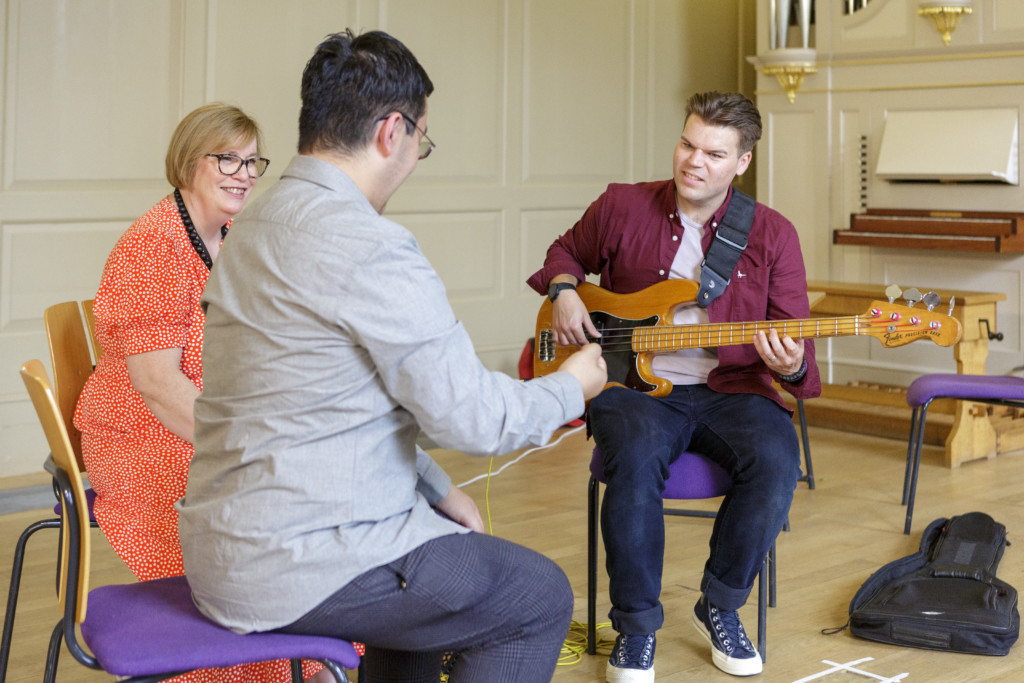
How to Apply
Applications for September 2024 are now open and can be made via UCAS Conservatoires. Follow our step-by-step application guide.
Please contact admissions@trinitylaban.ac.uk or the Programme Leader Tim Palmer t.palmer@trinitylaban.ac.uk with any enquiries.
Subscribe to our Professional Development-Music mailing list to hear updates first about the MEd Music Education (Online) and other music education programmes with Trinity Laban.
Key Facts
| UCAS | 555P |
|---|---|
| Location | Online Learning |
| Duration | 2 - 4 years |
| Start Date | September 2024 |
The Teaching Musician
Hear from current & past students. Please note that since this video was made the programme is now online only.
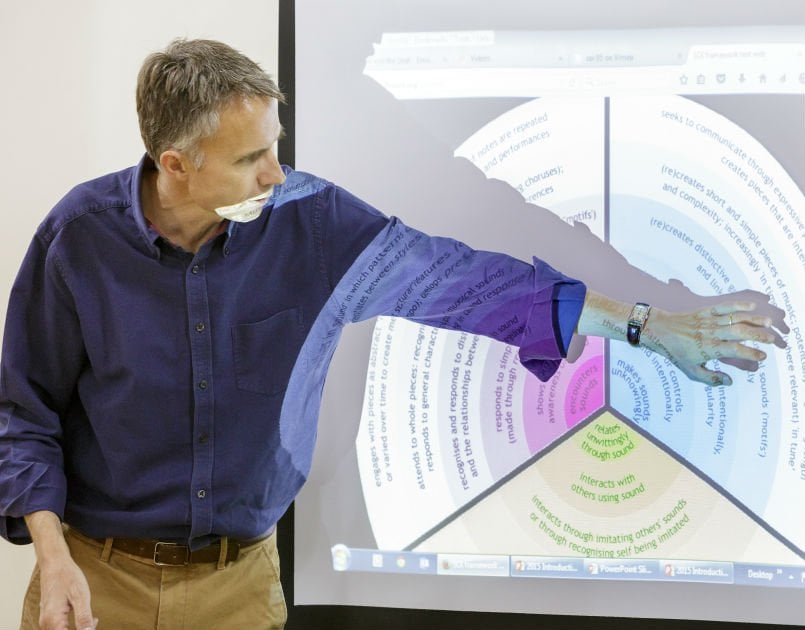
For Employers
Find out how music hubs and other employers can invest in workforce development by supporting staff to undertake the programme.
Find Out More

